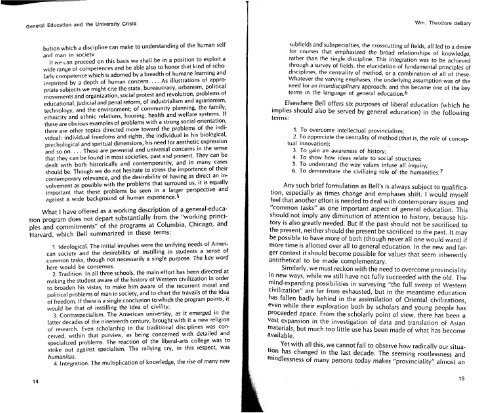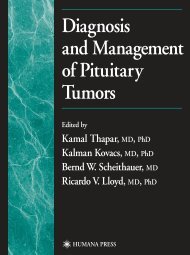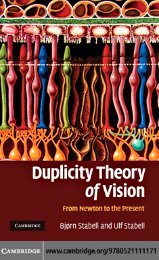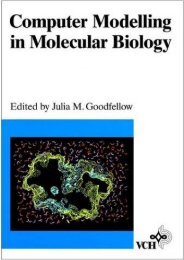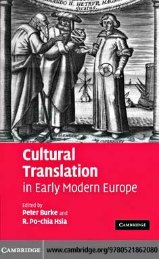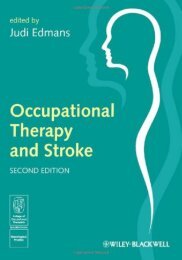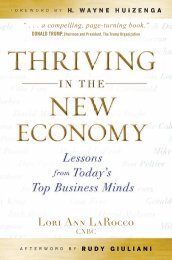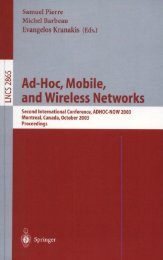<strong>General</strong> Education and <strong>the</strong> University CrisisWrn. <strong>The</strong>odore deBarybution which a discipline can make to understanding <strong>of</strong> <strong>the</strong> human selfand man in societvIt we can proceed on this basis we shall be in a position to exploit awide range <strong>of</strong> competences and be able also to honor that kind <strong>of</strong> scholarlycompetence which is adorned by a breadth <strong>of</strong> humane learning andinspirited by a depth <strong>of</strong> human concern. . . . As illustrations <strong>of</strong> appropriatesubjects we might cite <strong>the</strong> state, bureaucracy, urbanism, politicalmovements and organization, social protest and revolution, problems <strong>of</strong>educational, judicial and penal re<strong>for</strong>m, <strong>of</strong> industrialism and agrarianism,technology, and <strong>the</strong> environment; <strong>of</strong> community planning, <strong>the</strong> family,ethnicity and ethnic relations, housing, health and welfare systems. If<strong>the</strong>se are obvious examples <strong>of</strong> problems with a strong social orientation,<strong>the</strong>re are o<strong>the</strong>r topics directed more toward <strong>the</strong> problems <strong>of</strong> <strong>the</strong> individual:individual freedoms and rights, <strong>the</strong> individual in his biological,psychological and spiritual dimensions, his need <strong>for</strong> aes<strong>the</strong>tic expressionand so on. . . . <strong>The</strong>se are perennial and universal concerns in <strong>the</strong> sensethat <strong>the</strong>y can be found in most societies, past and present. <strong>The</strong>y can bedealt with both historically and contemporarily, and in many casesshould be. Though we do not hesitate to stress <strong>the</strong> importance <strong>of</strong> <strong>the</strong>ircontemporary relevance, and <strong>the</strong> desirability <strong>of</strong> having as direct an involvementas possible with <strong>the</strong> problems that surround us, it is equallyirnnortant that <strong>the</strong>se problems be seen in a larger perspective and...- r--- --against a wide background <strong>of</strong> human experience.5What i have <strong>of</strong>fered as a working description <strong>of</strong> a general-educationprogram does not depart substantially from <strong>the</strong> "working principlesand commitments" <strong>of</strong> <strong>the</strong> programs at Columbia, Chicago, andHarvard, which Bell summarized in <strong>the</strong>se terms:1. Ideological. <strong>The</strong> initial impulses were <strong>the</strong> unifying needs <strong>of</strong> Americansociety and <strong>the</strong> desirability <strong>of</strong> instilling in students a sense <strong>of</strong>common tasks, though not necessarily a single purpose. <strong>The</strong> key wordhere would be consensus.2. Tradition. In all three schools, <strong>the</strong> main ef<strong>for</strong>t has been .directed atmaking <strong>the</strong> student aware <strong>of</strong> <strong>the</strong> history <strong>of</strong> Western civilization in orderto broaden his vistas, to make him aware <strong>of</strong> <strong>the</strong> recurrent moral andpolitical problems <strong>of</strong> man in society, and to chart <strong>the</strong> travails <strong>of</strong> <strong>the</strong> idea<strong>of</strong> freedom. If <strong>the</strong>re is a single conclusion to which <strong>the</strong> program points, itwould be that <strong>of</strong> instilling <strong>the</strong> idea <strong>of</strong> civility.3. Contraspecialism. <strong>The</strong> American university, as it emerged in <strong>the</strong>latter decades <strong>of</strong> <strong>the</strong> nineteenth century, brought with it a new religion<strong>of</strong> research. Even scholarship in <strong>the</strong> traditional disciplines was conceived,within that purview, as being concerned with detailed andspecialized problems. <strong>The</strong> reaction <strong>of</strong> <strong>the</strong> liberal-arts college was tostrike out against specialism. <strong>The</strong> rallying cry, in this respect, washumanitas.4. Integration. <strong>The</strong> multiplication <strong>of</strong> knowledge, <strong>the</strong> rise <strong>of</strong> many newsubfields and subspecialties, <strong>the</strong> crosscutting <strong>of</strong> fields, all led to a desire<strong>for</strong> courses that emphasized <strong>the</strong> broad relationships <strong>of</strong> knowledge,ra<strong>the</strong>r than <strong>the</strong> single discipline. This integration was to be achievedthroclgh a survey <strong>of</strong> fields, <strong>the</strong> elucidation <strong>of</strong> fundamental principles <strong>of</strong>dizciplines, <strong>the</strong> centrality <strong>of</strong> method, or a combination <strong>of</strong> all <strong>of</strong> <strong>the</strong>se.Whatever <strong>the</strong> varying emphases, <strong>the</strong> underlying assumption was <strong>of</strong> <strong>the</strong>need <strong>for</strong> an interdisciplinary approach; and this became one <strong>of</strong> <strong>the</strong> keyterms in <strong>the</strong> language <strong>of</strong> general education.6Elsewhere Bell <strong>of</strong>fers six purposes <strong>of</strong> liberal education (which heimplies should also be served by general education) in <strong>the</strong> followingterms:1. To overcome intellectual provincialism;2. To appreciate <strong>the</strong> centrality <strong>of</strong> method (that is, <strong>the</strong> role <strong>of</strong> conceptual innovation);3. To gain an awareness <strong>of</strong> history;4. To show how ideas relate to social structures;5. To understand <strong>the</strong> way values infuse all inquiry;6. To demonstrate <strong>the</strong> civilizing role <strong>of</strong> <strong>the</strong> humanities.'Any such brief <strong>for</strong>mulation as Bell's is always subject to qualification,especially as times change and emphases shift. I would myselffeel that ano<strong>the</strong>r ef<strong>for</strong>t is needed to deal with contemporary issues and"common tasks" as one important aspect <strong>of</strong> general education. Thisshould not imply any diminution <strong>of</strong> attention to history, because historyis also greatly needed. But if <strong>the</strong> past should not be sacrificed to<strong>the</strong> present, nei<strong>the</strong>r should <strong>the</strong> present be sacrificed to <strong>the</strong> past. It maybe possible to have more <strong>of</strong> both (though never all one would want) ifmore time is allotted over all to general education. In <strong>the</strong> new and largercontext it should become possible <strong>for</strong> values that seem inherentlyanti<strong>the</strong>tical to be made complementary.Similarly, we must reckon with <strong>the</strong> need to overcome provincialityin new ways, while we still have not fully succeeded with <strong>the</strong> old. <strong>The</strong>mind-expanding possibilities in surveying "<strong>the</strong> full sweep <strong>of</strong> Westerncivilization" are far from exhausted, but in <strong>the</strong> meantime educationhas fallen badly behind in <strong>the</strong> assimilation <strong>of</strong> Oriental civilizations,even while <strong>the</strong>ir exploration both by scholars and young people hasProceeded apace. From <strong>the</strong> scholarly point <strong>of</strong> view, <strong>the</strong>re has been avast expansion in <strong>the</strong> investigation <strong>of</strong> data and translation <strong>of</strong> Asianmaterials, but much too little use has been made <strong>of</strong> what has becomeavailable.Yet with all this, we cannot fail to observe how radically our situationhas changed in <strong>the</strong> last decade. <strong>The</strong> seeming rootlessness andmindlessness <strong>of</strong> many persons today makes "provinciality" almost an
<strong>General</strong> Education and <strong>the</strong> University CrisisWm. <strong>The</strong>odore deBaryanachronism. <strong>The</strong>re are few local loyalties or parochial ties from whichone might be liberated. Nostalgia <strong>for</strong> a time when people "belonged"somewhere is pervasive. With few conventional molds left to break out<strong>of</strong>, <strong>the</strong> liberal tradition <strong>of</strong> mold breaking has only itself from which tobe emancipated. Thus "liberation" has come almost full circle, calling<strong>for</strong> a process <strong>of</strong> integration and consolidation as much as <strong>for</strong> expansion<strong>of</strong> <strong>the</strong> spirit. Again, general education has to deal with both <strong>of</strong><strong>the</strong>se contrasting needs-finding a human center without turning one'sback on <strong>the</strong> larger world and new experience-but since <strong>the</strong>se areneeds not limited to <strong>the</strong> young <strong>the</strong>re is every reason to expand and prolong<strong>the</strong> ef<strong>for</strong>t throughout <strong>the</strong> learning years.Ano<strong>the</strong>r point that subsequent events would lead us to underscoremore heavily perhaps than Bell did concerns <strong>the</strong> social implicationsand consequences <strong>of</strong> specialization. I have already spoken <strong>of</strong> <strong>the</strong>effects <strong>of</strong> specialization in <strong>the</strong> undue narrowing <strong>of</strong> individuals' horizonsand consequent intellectual isolation. In Bell's <strong>for</strong>mulations thisis dealt with as a limitation <strong>of</strong> <strong>the</strong> individual's self-development and afailure to achieve his full intellectual powers. No less significant is <strong>the</strong>positive danger to society and <strong>the</strong> whole human ecology that arisesfrom <strong>the</strong> pursuit <strong>of</strong> special technologies in ignorance <strong>of</strong> <strong>the</strong>ir largerconsequences. A distorted or one-sided intellectual development canunbalance not only <strong>the</strong> individual but society. This is so not only in <strong>the</strong>sense that one may have a deficient sense <strong>of</strong> social or political relevance,<strong>for</strong> even an obsession with "relevance" can be unduly narrowing;it is true also in <strong>the</strong> sense that knowledge is power and creates apotential-indeed a disposition-<strong>for</strong> its use, in ignorance<strong>of</strong> its full consequences.In this sense, one has a social as well as a personal responsibility<strong>for</strong> an awareness <strong>of</strong> one's ignorance, which can only be met,not by trying to know everything, but by cultivating an awareness <strong>of</strong><strong>the</strong> interdependence <strong>of</strong> knowledge and a sensitivity to <strong>the</strong> contributionso<strong>the</strong>rs can make to our own work.It would not be difficult to cite o<strong>the</strong>r respects in which <strong>the</strong> Bell<strong>for</strong>mulations might be somewhat amended today, but I shall limit myobservations to two main aspects: humanitas and <strong>the</strong> humanities, and<strong>the</strong> interdisciplinary approach. My earlier statement gave rise to somemisunderstanding and puzzlement as to what was intended in <strong>the</strong>seareas, and I should like to <strong>of</strong>fer some distinctions that may clarify<strong>the</strong>m.THE HUMANITIES, GENERAL AND PROFESSIONALFirst <strong>of</strong> all, <strong>the</strong>re is an obvious need to distinguish between <strong>the</strong> humanitiesin <strong>the</strong> general sense and in <strong>the</strong> pr<strong>of</strong>essional sense. <strong>General</strong> educa-tion in <strong>the</strong> humanities partakes <strong>of</strong> both, but <strong>the</strong> distinction remainsvalid and consequential. <strong>The</strong> general sense <strong>of</strong> <strong>the</strong> humanities expressesthose areas <strong>of</strong> human experience, concerns, values, and endsthat extend into virtually all <strong>for</strong>ms <strong>of</strong> study and give <strong>the</strong>m relevanceboth to <strong>the</strong> inner life <strong>of</strong> <strong>the</strong> individual and <strong>the</strong> common human enterprise.Humanities in this sense, as I have said be<strong>for</strong>e, include what hasbeen known as general education but also enter into specialized branches<strong>of</strong> knowledge ins<strong>of</strong>ar as <strong>the</strong> latter bear upon <strong>the</strong> perennial problems<strong>of</strong> human life. In o<strong>the</strong>r words, I am suggesting that we need an enlargeddefinition <strong>of</strong> <strong>the</strong> humanities if we are not to immure <strong>the</strong>m within<strong>the</strong> confines <strong>of</strong> belletristic studies, but ra<strong>the</strong>r keep <strong>the</strong>m open tonew <strong>for</strong>ms <strong>of</strong> human experience and expression.<strong>The</strong> humanities also represent, however, an area <strong>of</strong> traditional,pr<strong>of</strong>essional study, and exhibit <strong>the</strong> characteristics <strong>of</strong> all pr<strong>of</strong>essionaldisciplines, that is, a sense <strong>of</strong> commitment to precise and rigorousmethods <strong>of</strong> study. For that very reason <strong>the</strong>y are likely to produce <strong>the</strong>narrowness that inheres in pr<strong>of</strong>essionalization. In o<strong>the</strong>r words, onedoes not necessarily find humanists among <strong>the</strong> pr<strong>of</strong>essionals in <strong>the</strong> humanities,and <strong>the</strong> latter are as likely to be defensive and parochialabout <strong>the</strong>ir own interests as any o<strong>the</strong>r pr<strong>of</strong>essionals committed to avalid discipline. One hardly need add that, by <strong>the</strong> same token, humanistsare found outside <strong>the</strong> humanities disciplines, and <strong>of</strong>ten it is <strong>the</strong>yscientistsand engineers-who are more conscious <strong>of</strong> <strong>the</strong> need createdby <strong>the</strong>ir own specialization to establish bridges to o<strong>the</strong>r disciplines.<strong>The</strong> humanities pr<strong>of</strong>essional (if I may use that awkward expression<strong>for</strong> want <strong>of</strong> a better one at <strong>the</strong> moment) brings to general education anindispensable tool, <strong>of</strong> wide use as a liberal discipline even when it isnot pursued in some specialized <strong>for</strong>m. This is skill and experience inreading and interpreting materials significant to <strong>the</strong> humanist. Thus <strong>the</strong>humanities pr<strong>of</strong>essional in <strong>the</strong> various branches <strong>of</strong> language, linguistics,literature, art, music, philosophy, and religion has an indispensablerole in making available <strong>for</strong> general education, texts and o<strong>the</strong>r<strong>for</strong>ms <strong>of</strong> expression in <strong>the</strong> arts that could not be accurately and fullyunderstood o<strong>the</strong>rwise. As a humanist he may also become particularlyadept at handling <strong>the</strong>se materials in such a way as to make <strong>the</strong>m especiallymeaningful to his students. In his first function as translator orscholar, he feels a pr<strong>of</strong>essional obligation to convey accurately to <strong>the</strong>reader <strong>the</strong> original meaning <strong>of</strong> <strong>the</strong> work as it was intended by <strong>the</strong>author within <strong>the</strong> original context. Bernard Weinberg <strong>of</strong> <strong>the</strong> University<strong>of</strong> Chicago speaks <strong>of</strong> <strong>the</strong> humanities disciplines as engaged in "reading"works <strong>of</strong> art, music, literature, and philosophy "according to <strong>the</strong>Principles <strong>of</strong> <strong>the</strong> art or science which generated <strong>the</strong> work."8 As a humanist,on <strong>the</strong> o<strong>the</strong>r hand, a teacher would fur<strong>the</strong>r hope to relate that
- Page 1 and 2: THEOther books published in coopera
- Page 3 and 4: ContentsIntroductionSidney HookxiGE
- Page 5 and 6: IntroductionSidney HookNew York Uni
- Page 7 and 8: GENERAL EDUCATION -CHALLENGEAND JUS
- Page 9 and 10: General Education and the Universit
- Page 11 and 12: General Education and the Universit
- Page 13: General Education and the Universit
- Page 17 and 18: General Education and the Universit
- Page 19 and 20: General Education and the Universit
- Page 21 and 22: General Education: The Minimum Indi
- Page 23 and 24: General Education: The Minimum Indi
- Page 25 and 26: General Education: The Minimum Indi
- Page 27 and 28: On Reviving Liberal Education-inthe
- Page 29 and 30: On Reviving Liberal Education-in th
- Page 31 and 32: On Reviving Liberal Education-inthe
- Page 33 and 34: Humanism and the HumanitiesFrederic
- Page 35 and 36: Humanism and the HumanitiesFrederic
- Page 37 and 38: Humanism and the HumanitiesFrederic
- Page 39 and 40: Humanism and the HumanitiesFrederic
- Page 41 and 42: Humanism and the HumanitiesFrederic
- Page 43 and 44: Humanism and the HumanitiesFrederic
- Page 45 and 46: Justifying the HumanitiesRonald Ber
- Page 47 and 48: Observations on Humanism and Histor
- Page 49 and 50: Observations on Humanism and Histor
- Page 51 and 52: The Language and Methods of Humanis
- Page 53 and 54: The Language and Methods of Humanis
- Page 55 and 56: The Language and Methods of Humanis
- Page 57 and 58: Science, Science Teaching, and Rati
- Page 59 and 60: Science, Science Teaching, and Rati
- Page 61 and 62: Science, Science Teaching, and Rati
- Page 63 and 64: Science, Science Teaching, and Rati
- Page 65 and 66:
Science, Science Teaching, and Rati
- Page 67 and 68:
In Defense of Scientific Knowledgei
- Page 69 and 70:
In Defense of Scientific KnowledgeE
- Page 71 and 72:
The Uses and Limitations of Science
- Page 73 and 74:
The Uses and Limitations of Science
- Page 75 and 76:
The Uses and Limitations of Science
- Page 77 and 78:
Multilevel Teaching of the Natural
- Page 79 and 80:
The Social Sciences in Liberal Educ
- Page 81 and 82:
The Social Sciences in Liberal Educ
- Page 83 and 84:
The Social Sciences in Liberal Educ
- Page 85 and 86:
The Social Sciences in Liberal Educ
- Page 87 and 88:
The Economist Among the Social Scie
- Page 89 and 90:
The Economist Among the Social Scie
- Page 91 and 92:
Social Science and General Educatio
- Page 93 and 94:
A Role for Social Science?Robert L.
- Page 95 and 96:
Experiential Educationand Revitaliz
- Page 97 and 98:
Experiential Education and Revitali
- Page 99 and 100:
Experiential Education and Revitali
- Page 101 and 102:
Experiential Education and Revitali
- Page 103 and 104:
Experiential Education and Revitali
- Page 105 and 106:
Experiential Education and Revitali
- Page 107 and 108:
Education for the Future: The Liber
- Page 109 and 110:
Education for the Future: The Liber
- Page 111 and 112:
The Desirability of Pulling in One'
- Page 113 and 114:
On Sharpening the HornsSidney Hooki
- Page 115 and 116:
~ The Humanities as Scholarshipand
- Page 117 and 118:
The Humanities as Scholarship and a
- Page 119 and 120:
Questions of Viability in Nontradit
- Page 121 and 122:
On Interdisciplinary EducationHowar
- Page 123 and 124:
On Interdisciplinary EducationHowar
- Page 125 and 126:
The Logic of the Social Sciences: T
- Page 127 and 128:
The Logic of the Social Sciences: T
- Page 129 and 130:
The Logic of the Social Sciences: T
- Page 131 and 132:
A Pro~osal for a New Division of th
- Page 133 and 134:
A Proposal for a New Division of th
- Page 135 and 136:
New Beginnings in General Education
- Page 137 and 138:
Thoughts on a Social-Science Curric
- Page 139 and 140:
Thoughts on a Social-Science Curric
- Page 141 and 142:
Thoughts on a Social-Science Curric
- Page 143 and 144:
Thoughts on a Social-Science Curric
- Page 145 and 146:
The Specter at the Feastevaluated.
- Page 147:
ContributorsContributorsLearned Soc


